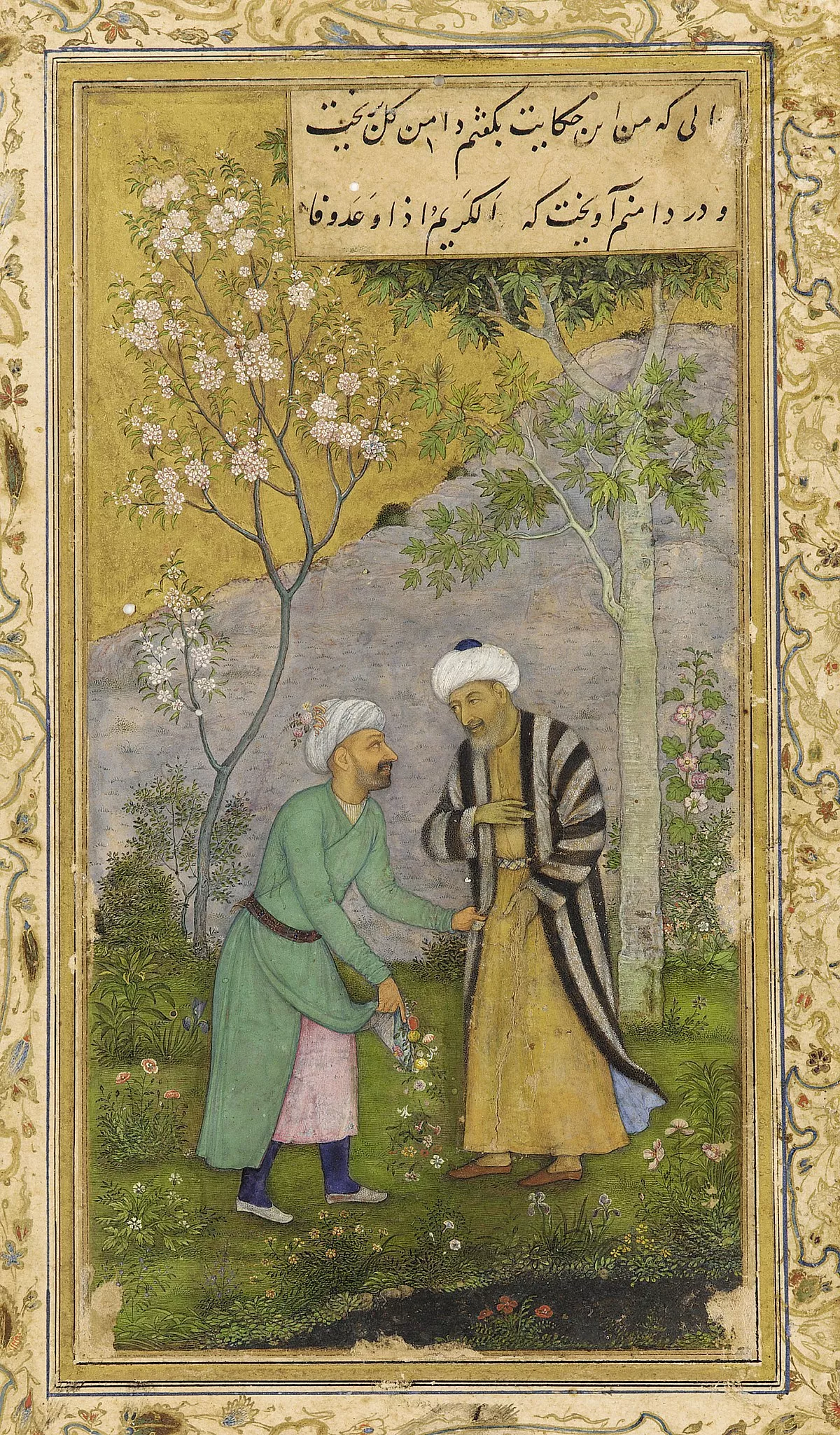 1.
1. Saadi Shirazi is recognized for the quality of his writings and for the depth of his social and moral thoughts.

 1.
1. Saadi Shirazi is recognized for the quality of his writings and for the depth of his social and moral thoughts.
Saadi Shirazi has been quoted in the Western traditions as well.
Saadi Shirazi's birth date is uncertain; most scholars consider him to have been born in 1209 or 1210.
Saadi Shirazi was from the city of Shiraz, the provincial capital of the Fars province.
The Iranian scholar Zabihollah Safa came to the conclusion that "Muslih" was Saadi Shirazi's given name and gives his full name as "Abu Muhammad Musharrif al-Din Muslih ibn Abd-Allah ibn Musharrif" based on the preface to one of the oldest surviving compilations of Saadi Shirazi's collected works, which was created by his fellow townsman Ali ibn Ahmad ibn Abu Bakr Bisotun in 1326.
Saadi Shirazi appears to have received his early education from his father, who instilled in him lifelong tolerance values.
Ibn al-Jawzi, a Hanbalite scholar, was one of Saadi Shirazi's teachers while he was a fellowship student at the Nizamiyyah school in Baghdad.
Saadi Shirazi was keen to restore his connections to the Salghurid dynasty, as evidenced by the speed with which the Bustan and Gulistan were published and their dedications.
Saadi Shirazi composed three poems honoring the second of them, Saljuk Shah ibn Salghur, during his brief five-month reign in 1263.
Saadi Shirazi did not seem to have supported the rise of the Mongol Empire.
In spite of this, Saadi Shirazi composed a poem in honor of the transition of authority from the Salghurids to the Mongols, and his writings include a number of poems with similar dedications to both the Mongol rulers and their Persian administrators.
Saadi Shirazi wrote four qasidas and the prose treatise Dar tarbiat-e yaki az moluk to him.
Saadi Shirazi is remembered as a panegyrist and lyricist, the author of a number of odes portraying human experience, and of particular odes such as the lament on the fall of Baghdad after the Mongol invasion in 1258.
Saadi Shirazi's lyrics are found in Ghazaliyat and his odes in Qasa'id.
Saadi Shirazi is known for a number of works in Arabic.
The Ghazals of Saadi Shirazi are a collection of poems written by Saadi Shirazi in the form of ghazal, and several critical editions of these poems have been published by scholars of Persian language and literature.
Saadi Shirazi paid special attention to the language of Sanai and Anvari in the composition of his ghazals.
The central theme of most of Saadi Shirazi's ghazals is love.
Saadi Shirazi is one of the few poets whose romantic ghazals remain focused on love from beginning to end.
Saadi Shirazi paid special attention to circular meters in the composition of his ghazals.
In editing Saadi Shirazi's collected works, Foroughi separated the mystical and didactic ghazals from the others and placed them in a separate chapter titled "Admonitions".
Saadi Shirazi's ghazals are collected in four books: Tayyibat, Bada'i, Khawatim, and Ghazaliyat-e Qadim.
In some editions of Saadi Shirazi's collected works, the multilingual ghazals are placed in a separate section titled "Multilingual Ghazals," which, according to Mohammad Ali Foroughi, is a false division since it does not appear in older manuscripts.
Musa Anwar, comparing these poems to those of Arabic-speaking poets of Saadi Shirazi's time, believes that they hold a respectable position and are valuable in terms of content and structure.
Saadi Shirazi is well known for his aphorisms, the most famous of which, Bani Adam, is part of the Gulistan.
Saadi Shirazi who has no sympathy for human suffering, Is not worthy of being called a human being.
Saadi Shirazi distinguished between the spiritual and the practical or mundane aspects of life.
The unique thing about Saadi Shirazi is that he embodies both the Sufi Sheikh and the travelling merchant.
Chief among works influenced by Saadi Shirazi is Goethe's West-Oestlicher Divan.
In later times, poetry of this order [Ferdowsi's epic poetry] had a sequel in love epics of extraordinary tenderness and sweetness; but there followed a turn toward the didactic, where, with a rich experience of life, the far-traveled Saadi Shirazi was master before it submerged itself in the depths of the pantheistic mysticism taught and recommended in the extraordinary tales and legendary narrations of the great Jalal-ed-Din Rumi.
Ralph Waldo Emerson was interested in Saadi Shirazi's writings, contributing to some translated editions himself.